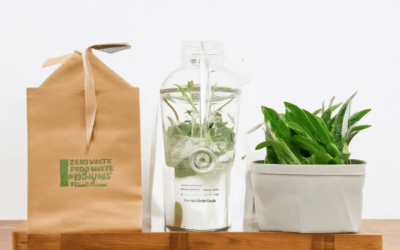Are you ready to transform your daily routine into something that nourishes both your body and the planet? Embracing a green lifestyle doesn’t mean drastic overhauls—it’s about making mindful, sustainable choices that fit seamlessly into your existing routine. By adopting eco-friendly habits, you can improve your well-being while playing a vital role in preserving our planet for future generations. This article offers green lifestyle inspiration, providing practical tips and insights to help you create a sustainable daily routine that’s both fulfilling and impactful. From reducing waste to incorporating eco-friendly products, discover how even small changes can lead to a greener lifestyle. Let’s embark on this journey together and explore the simple steps that can transform your life and the world around you.
Key Takeaways
– Adopt renewable energy sources like solar panels to power your home sustainably.
– Reduce single-use plastics by using reusable items such as bags, bottles, and containers.
– Support local farmers to lower food transport emissions and promote eco-friendly practices.
– Minimize chemical use by choosing non-toxic cleaning and personal care products.
– Conserve water by fixing leaks, collecting rainwater, and avoiding excessive usage.
– Plant trees to combat deforestation and improve air quality in your community.
– Use public transportation, bike, or walk to reduce carbon emissions in your daily routine.
– Recycle and reduce waste by separating recyclables, compostables, and trash properly.
– Go plastic-free by opting for reusable alternatives to help protect marine environments.
– Adopt a plant-based diet to lower greenhouse gas emissions and support sustainable agriculture.
– Volunteer for cleanups or join local sustainability groups to protect your surroundings.
– Turn off lights and electronics when not in use to save energy and reduce your carbon footprint.
– Explore eco-friendly living tips to discover more ways to make a positive impact on the planet.

What is the Green Lifestyle?
The green lifestyle refers to a sustainable way of living that prioritizes environmental health, social equity, and economic vitality. It involves making conscious choices to reduce your ecological footprint while enhancing the quality of life for yourself and future generations.
Key Principles of the Green Lifestyle
The green lifestyle is built on several core principles:
- Reduce consumption: Minimize your reliance on resources that harm the environment, such as fossil fuels and non-renewable materials.
- Waste less: Practice effective waste reduction through recycling, composting, and reusing items.
- Rethink cultural norms: Challenge conventional practices that may have negative environmental impacts.
- Seek cleaner solutions: Opt for alternatives that are environmentally friendly, such as renewable energy and sustainable products.
Practical Steps Toward a Greener Lifestyle
Adopting a green lifestyle can involve various daily actions, from small changes to significant lifestyle adjustments. Here are some practical steps:
Reducing Your Ecological Footprint
- Conservation of Resources: Use energy-efficient appliances, turn off lights when not needed, and opt for natural light whenever possible.
- Sustainable Transportation: Choose public transport, bike, or walk instead of driving. Consider electric vehicles for longer distances.
- Reduction of Waste: Compost organic waste, recycle paper, glass, and metal, and minimize plastic use by bringing reusable containers.
Embracing Renewable Energy
Switching to renewable energy sources like solar or wind power can significantly reduce your carbon footprint. Explore government incentives and installations that support renewable energy adoption.
Purchasing Sustainable Products
Look for products made from recycled materials or sustainably sourced ingredients. Support brands that commit to ethical and environmental practices.
Eating for the Earth
Adopt a plant-based diet or reduce meat consumption to lower your food-related carbon emissions. Choose locally-grown foods to reduce transportation costs and support local economies.
Building a Greener Community
Get involved in local sustainability initiatives, such as clean-up drives or tree-planting events. Join groups focused on environmental conservation and advocacy.
By integrating these practices into your daily life, you can contribute to a healthier planet while enjoying a more fulfilling and intentional lifestyle. Remember, every small change makes a difference.
How to Start a Green Lifestyle
Starting a green lifestyle can feel overwhelming, but taking it step by step makes it manageable. Here’s a guide to help you begin:
- Reduce Waste: Begin by recycling more effectively and using reusable items like cloth bags and water bottles. Separate organic waste for composting and avoid single-use plastics.
- Compost:** Start a compost pile with kitchen scraps and yard waste. Use a compost bin and avoid non-compostable items like dairy products.
- Conserve Water:** Turn off taps while brushing teeth, install low-flow fixtures, and collect rainwater for plants.
- Eat Sustainably:** Reduce meat consumption and opt for plant-based proteins. Buy local and seasonal foods to minimize transportation emissions.
- Save Energy:** Switch to LED lights, turn off unused electronics, and consider solar panels if feasible. Research local incentives for installations.
- Reduce Plastic Use:** Use reusable containers, cloth bags, and products packaged in biodegradable materials. Avoid single-use items.
- Sustainable Transportation:** Walk, bike, or carpool. If driving, choose hybrid or electric vehicles and combine trips to reduce fuel use.
- Clothing Choices:** Opt for second-hand, thrifted, or sustainable fabrics. Support local artisans and small businesses.
- Minimize Chemicals:** Use natural cleaning products like vinegar and baking soda. Check labels for harmful chemicals in personal care products.
- Advocate for Sustainability:** Stay informed on environmental issues and support causes through petitions or donations. Share knowledge to encourage others.
- Track Progress:** Keep a journal to document changes and celebrate milestones, like successful recycling habits or reduced energy use.
Remember, every small change contributes to a healthier planet. Start small and gradually incorporate these practices for a more sustainable lifestyle.

The 7 Rs of Sustainable Living
Sustainable living is a lifestyle that focuses on reducing harm to the environment while promoting social and economic well-being. One popular framework for understanding sustainable living is the 7 Rs, which extend the traditional 3 Rs of reduce, reuse, and recycle. These principles provide a holistic approach to living more eco-consciously. Here’s a breakdown of each:
- Reduce : Minimize consumption of non-renewable resources and avoid wasting materials. Simple daily actions like turning off lights or reducing plastic use can make a big difference.
- Reuse : Find creative ways to give items a second life. For example,旧衣物可以变成清洁布,玻璃罐可以用作储存容器。
- Recycle : When reduce and reuse aren’t possible, recycling is the next best option. Ensure you’re recycling correctly by checking local guidelines and separating recyclables from trash.
- Refuse : Refrain from purchasing items that contribute to waste, such as single-use plastics or unnecessary packaging. Support companies that offer sustainable alternatives.
- Rethink : Challenge conventional habits and practices. Consider alternative transportation methods, like biking or walking, and opt for bulk shopping to reduce packaging waste.
- Repurpose : Transform discarded items into something useful. This could involve fixing broken furniture or converting food scraps into compost.
- Regift : Give thoughtfully and sustainably. Choose gifts that have minimal packaging and are made ethically, supporting fair trade practices.
Eco Planeta Verde encourages everyone to adopt these practices in their daily lives. By embracing the 7 Rs, individuals can significantly reduce their environmental footprint while fostering a more sustainable future. Visit our sustainable living guide for more tips and resources to get started.

What Are 10 Examples of Green?
- Solar Panels: A renewable energy source that converts sunlight into electricity.
- Reusable Bags: Reducing plastic waste by choosing eco-friendly alternatives.
- LED Lights: Energy-efficient lighting that lasts longer and uses less power.
- Eco-Friendly Water Bottles: Made from sustainable materials like bamboo or glass.
- Organic Farming: Growing crops without synthetic pesticides or fertilizers.
- Electric Vehicles: Cars and buses powered by electricity, reducing emissions.
- Composting Systems: Turning kitchen scraps and yard waste into nutrient-rich soil.
- Recycled Products: Items made from recycled materials to reduce waste.
- Sustainable Architecture: Buildings designed to minimize environmental impact.
- Green Transportation: Bicycles and public transit options promoting sustainability.
What Are Some Green Habits?
We all can contribute to a healthier planet by adopting sustainable practices in our daily lives. Here are ten simple yet impactful green habits to consider:
- Reduce Waste: Minimize plastic use, recycle whenever possible, and compost organic materials to lower landfill waste.
- Energy Efficiency: Opt for energy-efficient appliances and turn off lights when not needed to conserve power.
- Sustainable Transportation: Choose public transport, bike, or walk whenever feasible to reduce carbon emissions.
- Plant Trees: Tree planting helps combat deforestation and improves air quality, making it a rewarding green habit.
- Support Local Farms: Buy seasonal produce to reduce food miles and promote eco-friendly farming practices.
- Minimize Chemical Use: Use non-toxic cleaning products and avoid harmful pesticides in gardens.
- Conserve Water: Fix leaks, collect rainwater, and avoid excessive watering to preserve this vital resource.
- Go Plastic-Free: Use reusable containers, bottles, and wraps to cut down on single-use plastics.
- Adopt a Plant-Based Diet: Reducing meat consumption lowers greenhouse gas emissions and supports sustainable agriculture.
- Get Involved in Cleanups: Participate in local clean-up drives or beach cleanups to protect our environment.
By incorporating these habits into our routines, we can make a meaningful difference for future generations. Remember, every small effort counts toward creating a more sustainable world. Explore more tips and resources on our eco-friendly living page to learn how you can continue making positive changes.

Examples of Green Practices
- Recycle and reduce waste by separating recyclables, compostables, and trash.
- Turn off lights and electronics when not in use to save energy.
- Use reusable water bottles, containers, and cloth bags to minimize plastic use.
- Plant trees or support tree-planting initiatives to improve air quality and biodiversity.
- Use public transportation, bike, walk, or carpool to reduce carbon emissions.
- Buy locally-grown and seasonal foods to reduce food transport emissions.
- Support sustainable agriculture by purchasing organic or fair-trade products.
- Compost kitchen scraps to create nutrient-rich soil and reduce landfill waste.
- Minimize chemical use by choosing non-toxic cleaning and personal care products.
- Participate in community clean-up events or beach cleanups to protect local ecosystems.
- Reduce energy consumption by using LED lights and energy-efficient appliances.
- Adjust thermostat settings and insulate homes to lower heating and cooling costs.
- Use renewable energy sources like solar panels or wind power for electricity.
- Support companies and organizations that commit to sustainability and ethical practices.
- Purchase products made from recycled materials to reduce resource depletion.
- Volunteer for environmental causes or join local sustainability groups.
- Reduce paper usage by opting for digital communication and document sharing.
- Encourage workplaces to adopt green policies and recycling programs.
- Organize eco-friendly office events or challenges to promote sustainability.
- Advocate for stricter environmental regulations and policies in your community.
- Spread awareness about green practices through social media or educational campaigns.
By incorporating these practices into daily life, individuals and communities can contribute to a healthier planet and a more sustainable future.




0 Comments